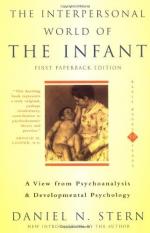
|
| Name: _________________________ | Period: ___________________ |
This test consists of 15 multiple choice questions and 5 short answer questions.
Multiple Choice Questions
1. Each of the separate emotions of an infant are assigned invariant self-_________ to associate with it.
(a) Stories.
(b) Myths.
(c) Events.
(d) Truths.
2. The self with the other comes about when the distinct ________ is integrated with the idea of the distinct other.
(a) Headspace.
(b) Body.
(c) Thought process.
(d) Self.
3. The domain of intersubjective relatedness arises from something called _______ attunement, according to Stern.
(a) Impact.
(b) Movement.
(c) Effect.
(d) Affect.
4. There is some debate about how the elements in question 10 relate to the sense of self including all of the following ideas except _______.
(a) Obscuring an existing sense of self.
(b) Creating the sense of self.
(c) Transformation of the sense of self.
(d) Revealing an existing sense of self.
5. According to the author, the infant has a sense of _______ for themselves and for the other and can then form relations between the two.
(a) Movement.
(b) Name.
(c) Core self.
(d) Identity.
6. ___________ psychology has neglected the idea of intersubjective relatedness in regards to infants, according to the author.
(a) Popular.
(b) Research oriented.
(c) Therapeutic.
(d) Academic.
7. Self-_________ becomes tied to the behaviors of the self-regulating other because they occur together.
(a) Understanding.
(b) Coherence.
(c) Identity.
(d) Experience.
8. The self with the other is a _________ experience, including merging, fusings, security gratification, and more, according to the author.
(a) Honest.
(b) Subjective.
(c) Objective.
(d) Natural.
9. According to the book, the ______ infant was thought to be connected to the social world.
(a) Objective.
(b) Observed.
(c) Small.
(d) Clinical.
10. The term _______ emergence is used as a way to think about how the infant at this stage experiences the world.
(a) Local.
(b) Global.
(c) Familial.
(d) Individual.
11. Stern asserts that the sense of self is certainly present following language use and ______ awareness.
(a) External.
(b) Self-reflective.
(c) Reflective.
(d) Constructive.
12. The coherence of _______ is the sense that an obvious property belongs to someone, according to the author.
(a) Locus.
(b) Location.
(c) Power.
(d) Form.
13. The infant is actually embedded within a social _______ which is the consequence of the actions of others, according to the author.
(a) System.
(b) Motion.
(c) Web.
(d) Matrix.
14. Experiences of being with an other are active acts of _________ which come about due to the active integration process.
(a) Learning.
(b) Impersonality.
(c) Integration.
(d) Development.
15. According to the book, Erickson suggested several stages of development that included all of the following except _____.
(a) Sensory.
(b) Autonomy.
(c) Industry.
(d) Trust.
Short Answer Questions
1. According to the book, Stern focuses on the sense of self because it can generate a/an ________ pattern of awareness.
2. Unlike other thinkers in the field, the author suggests that each developmental stage is ______.
3. Constructionistic efforts are rooted in all of the following elements except ________.
4. There have been several revolutions in _______ that have enabled the formation of new experimental paradigms.
5. What type of psychology has NOT neglected the story of intersubjective relatedness, according to Stern?
|
This section contains 462 words (approx. 2 pages at 300 words per page) |

|




